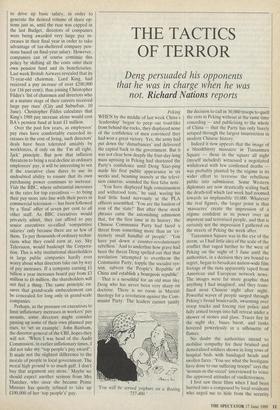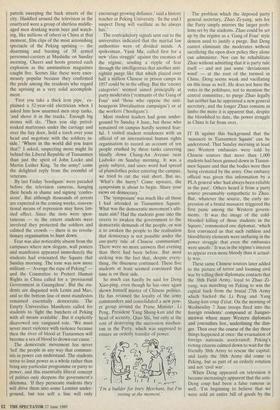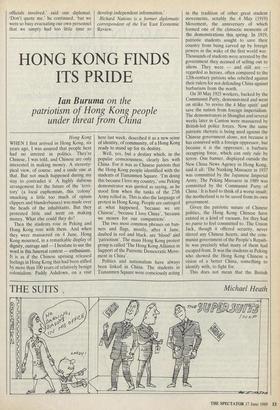THE TACTICS OF TERROR
Deng persuaded his opponents that he was in charge when he was
not. Richard Nations reports Peking WHEN by the middle of last week China's `leadership' began to peep out toad-like from behind the rocks, they displayed none of the confidence of men convinced they had won a great victory. Yes, the army had put down the 'disturbances' and delivered the capital back to the government. But it was not clear how deeply the four-day-long mass uprising in Peking had shattered the Party's confidence until Deng Xiao-ping made his first public appearance in six weeks and, beaming inanely at the televi- sion cameras, sounded the first false note.
'You have displayed high consciousness and withstood tests,' he said, waving his frail little hand nervously at the PLA officers assembled. 'You are the bastion of iron of the state!' But after these stock phrases came the astonishing admission that, for the first time in its history, the Chinese Communist Party had faced a threat from something more than an 'ex- tremely small handful of people'. 'You have put down a counter-revolutionary rebellion.' And to underline how grave had been the threat Deng spelled out that that revolution 'attempted to overthrow the Communist Party, topple the socialist sys- tem, subvert the People's Republic of China and establish a bourgeois republic'.
That is a mouthful for an old man like Deng who has never been very sharp on doctrine. There is no room in Marxist theology for a revolution against the Com- munist Party. The leaders cannot justify You will be served yoghurt on a Boeing 737-400.' the decision to call in 30,000 troops to quell the riots in Peking without at the same time conceding — and publicising to the whole of China — that the Party has only barely scraped through the largest insurrection in modern Chinese history.
Indeed it now appears that the image of a bloodthirsty massacre in Tiananmen Square — those in the square all night (myself included) witnessed a negotiated withdrawal with few confirmed deaths was probably planted by the regime in its wider effort to terrorise the rebellious public into submission. Some Western diplomats are now drastically scaling back the death-toll which last week had zoomed towards an implausible 10,000. Whatever the real figures, the larger point is that `massacres' create the impression of a regime confident in its power over an impotent and terrorised people, and that is certainly not the impression I gathered on the streets of Peking the week after.
Tiananmen Square was in the eye of the storm, so I had little idea of the scale of the conflict that raged further to the west of Peking on the night of 3 June until the authorities, in a decision they are bound to regret, began to broadcast nation-wide film footage of the riots apparently taped from American and European network news. The images were far more graphic than anything I had imagined, and they trans- fixed most Chinese night after night. Powerful waves of people surged through Peking's broad boulevards, swarming over troop trucks and forcing riot police and fully armed troops into full retreat under a shower of stones and glass. Tracer fire lit the night sky, buses burnt, and tanks hovered powerlessly in a silhouette of flames.
No doubt the authorities intend to mobilise sympathy for their bruised and demoralised soldiers shown in long rows of hospital beds with bandaged heads and swollen faces. 'You see what the hooligans have done to our suffering troops!' says the `woman-in-the-street' interviewed to voice the approved attitudes of vindictiveness.
I first saw these films when I had been hurried into a compound by local residents who urged me to hide from the security patrols sweeping the back streets of the city. Huddled around the television in the courtyard were a group of shirtless middle- aged men drinking warm beer and watch- ing, like millions of others in China at that moment, film clips of the most astonishing spectacle of the Peking uprising — the disarming and burning of 38 armed personnel-carriers at Mushidie on Sunday morning. Cheers and hoots greeted each explosion as the ammunition magazines caught fire. Scenes like these were enor- mously popular because they confirmed the pride among the residents who regard the uprising as a very solid accomplish- ment.
'First you take a thick iron pipe,' ex- plained a 52-year-old electrician when I asked him how unarmed men stop tanks, 'and shove it in the tracks.' Enough big stones will do. 'Then you slip petrol- soaked mattresses under the carriage and over the bay door, hold a torch over your head and negotiate with the soldiers in- side.' Where in the world did you learn that?' I asked, suspecting more might lie behind the Liberal Republic of Tiananmen than just the spirit of John Locke and Martin Luther King. 'In the army!' came the delighted reply from the roomful of veterans.
By last Friday 'hooligans' were paraded before the television cameras, hanging their heads in shame and signing 'confes- sions'. But although thousands of arrests are expected in the coming weeks, conven- tional means of repression may have lim- ited effect. Since the riots were spon- taneous — to the extent students were involved they protected the soldiers and calmed the crowds — there is no revolu- tionary organisation to hunt down.
Fear was also noticeably absent from the campuses where new slogans, wall posters and manifestos appeared immediately the students had evacuated the Square that Sunday morning. The tone was now more militant — 'Avenge the rape of Peking!' and the Committee to Protect Human Rights in China called for a 'provisional Government in Guangzhou'. But the stu- dents are disgusted with Lenin and Mao, and so the bottom line of most manifestos remained essentially democratic. The Empty Universities Manifesto called for students to 'fight the butchers of Peking with all means available'. But it explicitly disavowed any vanguard role. 'We must never meet violence with violence because then the river of blood at Tiananmen will become a sea of blood to drown our cause.'
The democratic movement has never 'led' the people in any way that commun- ists in power can understand. The students strive to limit power as a whole rather than bring any particular programme or party to power, and this essentially liberal concept of politics only deepens the government's dilemma. 'If they persecute students they will drive them into some Leninist under- ground, but too soft a line will only
encourage growing defiance,' said a history teacher at Peking University. 'In the end I suspect Deng will vacillate as he always has.'
The contradictory signals sent out to the universities indicated that the martial law authorities were of divided minds. A spokesman, Yuan Mu, called first for a new 'class struggle' against the enemies of the regime, sending a ripple of fear through the intelligentsia that another anti- rightist purge like that which placed over half a million Chinese in prison camps in 1957 could be in the offing. But the 'enemy categories' seemed aimed principally at party moderates ('remnants of the Gang of Four' and 'those who oppose the anti- bourgeois liberalisation campaigns') or at the workers ('hooligans').
Most student leaders had gone under- ground by Sunday 4 June, but those who remained on campus hardly seemed fear- ful. I visited student residences with an official of an international human rights organisation to record an account of ten people crushed by three tanks careering blindly down Chang-An Avenue near Liuboko on Sunday morning. It was a grisly subject, and since word had spread of plainclothes police entering the campus, we tried to cut the visit short. But no, `What's the hurry? Come upstairs, the symposium is about to begin. Share your views on democracy.'
The 'symposium' was much like all those I had attended in Tiananmen Square. What was the democratic movement's ulti- mate aim? Had the students gone into the streets to awaken the government to the democratic demands of the people, or was it to awaken the people to the realisation that democracy is not possible under the one-party rule of Chinese communism? There were no more answers that evening than there had been before. But most striking was the fact that, despite every- thing, the discourse continued. These five students at least seemed convinced that time is on their side.
So much can hardly be said for Deng Xiao-ping, even though he has once again shown himself master of Chinese politics. He has retained the loyalty of the army commanders and consolidated a new pow- er group around the Prime Minister, Li Peng, President Yang Shang-kun and the head of security, Qiao Shi, but only at the cost of destroying the succession mechan- ism in the Party, which was supposed to ensure an orderly transfer of power.
'I'm a builder for Itnry Merchant, but I'm resting at the moment.'
The problem which the deposed party general secretary, Zhao Zi-yang, sets for the Party simply mirrors the larger prob- lems set by the students. Zhao could be set up by the regime as a 'Gang of Four' style demon used to justify a purge. But Deng cannot eliminate the moderates without sacrificing the open door policy they alone can administer. Nor can he rehabilitate Zhao without admitting that it is party rule itself — and not just some `deviationist wind' — at the root of the turmoil in China. Deng seems weak and vacillating on this issue as well. He does not have the votes in the politburo, not to mention the central committee, to purge Zhao legally but neither has he appointed a new general secretary, and the longer Zhao remains in limbo the more it is apparent that, despite the bloodshed to date, the power struggle in China is far from over.
IT IS against this background that the 'massacre in Tiananmen Square' can be understood. That Sunday morning at least two Western embassies were told by Chinese sources that more than 1,000 students had been gunned down in Tianan- men Square and that the bodies were then being cremated by the army. One embassy official was given this information by a PLA general who 'had always been reliable in the past'. Others heard it from a party source presumably sympathetic to Zhao. But, whatever the source, the early im- pression of a brutal massacre triggered the first panic among the Western govern- ments. 'It was the image of the cold- blooded killing of those students in the Square,' commented one diplomat, 'which first convinced us that such ruthless and bloodthirsty elements were surfacing in the power struggle that even the embassies were unsafe.' It was in the regime's interest to appear even more bloody than it actual- ly was.
These same Chinese sources later added to the picture of terror and looming civil war by telling their diplomatic contacts that the 38th Field Army, loyal to Zhao Zi- yang, was marching on Peking to win the capital back from the brutal 27th Army which backed the Li Peng and Yang Shang-kun coup d'etat. On the morning of Wednesday 7 June troops fired into the foreign residents' compound at Jianguo- menwai where many Western diplomats and journalists live, underlining the dan- ger. Then over the course of the day three things happened at once: the evacuation of foreign nationals accelerated; Peking's rioting citizens calmed down to wait for the friendly 38th Army to rescue the capital; and lastly the 38th Army did come to Peking, but as part of an orderly rotation and not 'civil war'.
When Deng appeared on television it became increasingly apparent that the anti7 Deng coup had been a false rumour as well. 'I'm beginning to believe that we were sold an entire bill of goods by the officials involved,' said one diplomat. 'Don't quote me,' he continued, 'but we were so busy evacuating our own personnel that we simply had too little time to develop independent information.' Richard Nations is a former diplomatic correspondent of the Far East Economic Review.




















































 Previous page
Previous page